Μητροπολίτης Σουηδίας Κλεόπας, Τί απέγιναν τα τριάκοντα αργύρια;
Ομιλία στην Μεγάλη Παρασκευή
Η Ορθόδοξος Εκκλησία, σε ολόκληρο τον κόσμο, τιμά σήμερα τον “Μεγάλο Νεκρό”, αναλογίζεται όμως ταυτόχρονα και την τραγική συμμετοχή της ανθρωπότητος στο Θείον Πάθος. Σαν σήμερα, το ανθρώπινον γένος, δίκην δικαστού, έκρινε και καταδίκασε τον Θεό, αποτιμώντας την αξία Του “τριάκοντα ἀργύρια”.
Ο Σεβ. Μητροπολίτης Αλεξανδρουπόλεως κ. Άνθιμος διερωτάται, σε ομιλία του: “Τί ἀπόγιναν τὰ τριάντα ἀργύρια;” και δίδει την ακόλουθη απάντηση: “Καθὼς ὁ Χριστὸς ἀνέβαινε στὸν Γολγοθᾶ συγχωρώντας τοὺς σταυρωτές Του, καθὼς ὁ Ἰούδας πήγαινε στὴν ἀγχόνη νὰ κρεμαστεῖ καὶ ὁ Πέτρος ντροπιασμένος στὸ ὑπερῶον νὰ κρυφτεῖ, ἐκείνη τὴ φοβερὴ στιγμή, ὁ Χριστὸς μὲ πλήρη αὐτοσυνειδησία καὶ ἐπίγνωση τῆς ἀποστολῆς Του, ἐπένδυσε τὰ τριάντα ἀργύρια τῆς μακάβριας ἀγοραπωλησίας του. Ἀγόρασε μ’ αὐτὰ γῆ γιὰ νὰ στεγάσει ὅσους οἱ προνομιοῦχοι ντόπιοι πετοῦσαν στὸν δρόμο. Ἀγόρασε χωράφι γιὰ νὰ τὸ δώσει προίκα σὲ ὅσους ὁ ζηλωτὴς Ἰούδας ἔκλεβε καὶ ὁ ἐγωϊστὴς Πέτρος ἀπαξίωνε. Σὲ ὅσους τότε οἱ Ἑβραῖοι θεωροῦσαν ξένους καὶ ἐπέβαλλαν σ’ αὐτούς, ἀκόμα καὶ νεκρούς, τὶς ἀποστάσεις ποὺ χώριζαν τὸν περιούσιο λαὸ ἀπὸ τοὺς ἄλλους, ὁ Χριστὸς τοὺς χάρισε στέγη.”
Ο Άγιος Ιουστίνος Πόποβιτς λέγει ότι, “Σήμερα ὁ διάβολος “σαρκώθηκε” μέσα στόν ἄνθρωπο, γιά νά ἀποσαρκώσῃ τόν Θεάνθρωπο. Σήμερα ὅλος ὁ Ἅδης μεταφέρθηκε στήν γῆ. Ποιός νά θυμᾶται ὅτι ἡ γῆ κάποτε ἦταν παράδεισος; Ἡ σημερινή πτῶσις τοῦ ἀνθρώπου εἶναι ἀσυγκρίτως μεγαλύτερη ἀπό τήν πρώτη πτῶσι. Τότε ὁ ἄνθρωπος ἀποστάτησε ἀπό τόν Θεό, ἀλλά σήμερα ἐσταύρωσε τόν Θεό, σκότωσε τόν Θεό. Δέν εἶναι ἡ γῆ χειρότερος Ἅδης ἀπό τόν Ἅδη;”
Ιδού τί λέγει ο προφήτης Ησαΐας, 600 χρόνια πριν την Σταυρική θυσία: “Κύριε, ποιός νά πιστέψει σέ ὅ,τι ἀκοῦν τά ἀφτιά μας; Τόν εἴδαμε καί δέν εἶχε μορφή, οὔτε κάλλοςˑ τό πρόσωπό Του ἦταν κακοποιημένο καί δέν ἦταν νά τό βλέπει ἄνθρωπος.”
Ο Άγιος Ιωάννης ο Δαμασκηνός περιγράφει την σύλληψη του Χριστού ως εξής: “Ἔφεγγε λοιπόν ἡ μέρα καί ἦταν πολύ πρωί, ὅταν ὁ Ἰησοῦς ὁδηγοῦνταν μέ δεμένα τά χέρια στό Πραιτώριο τοῦ Πιλάτου. Ποιά χέρια; Ἐκεῖνα πού θεράπευσαν τυφλούς καί γιάτρεψαν κουτσούς. Δέχτηκε τά δεσμά Αὐτός πού ἔλυσε τόν Λάζαρο ἀπό τά δεσμά τοῦ θανάτου. Στάθηκε μπροστά στόν Πιλάτο Αὐτός πού ἔχει θρόνο Του τόν οὐρανό. Ἀνεχόταν ὁ Δημιουργός νά Τόν σέρνουν τά δημιουργήματά Του, ὁ Πλάστης τά πλάσματά Του, ὁ Τεχνίτης τά ἔργα τῶν χεριῶν Του.”
Ο Άγιος Νικόλαος Βελιμίροβιτς ομιλεί για τον Χριστό στον Γολγοθά: “Εκείνος που αγαπά ολόκληρο το ανθρώπινο γένος, θανατώνεται από ανθρώπους! Όποιος έχει συνείδηση, ας ντραπεί! Όποιος έχει καρδιά, ας θρηνήσει! Όποιος έχει νου, ας κατανοήσει! Ο καλός Σαμαρείτης που έσωσε την ανθρωπότητα από τις πληγές που της είχαν προξενήσει οι ληστές, έπεσε ο ίδιος στα χέρια τους.
Γύρω από τον Κύριο υπήρχαν ο αμετανόητος ληστής που συσταυρώθηκε μαζί Του και ο ληστής που μετάνιωσε. Ο ένας απ’ αυτούς, αν και βρίσκεται στο κατώφλι του θανάτου, βλασφημεί, ο άλλος όμως προσεύχεται. Από τον κακούργο αυτόν μαθαίνουμε τη λυτρωτική μετάνοια, έστω και την έσχατη στιγμή του θανάτου· τη λυτρωτική φύση της προσευχής στον Θεό και την ταχύτητα με την οποία απαντά η αγάπη του Θεού.”
Ο Άγιος Λουκάς Αρχιεπίσκοπος Συμφερουπόλεως σχολιάζει την φράση “Ἴδε ὁ Ἀνθρωπος!”, που αναφώνησε ο Πιλάτος στον Ιουδαϊκό όχλο, όταν τους παρουσίασε τον Χριστό, με το αγκάθινο στεφάνι και το πορφυρό ιμάτιο: “Ας κραυγάσουμε κι εμείς με θαυμασμό: “Ἴδε ὁ Ἀνθρωπος!” Αυτός είναι ο πραγματικός, ο αληθινός και ένδοξος Άνθρωπος, ο άνθρωπος όπως τον είχε στο νου Του ο Θεός όταν έπλασε τον Αδάμ.
Ο Αθώος Αμνός γονάτισε από το βάρος του σταυρού στο δρόμο για το Γολγοθά. Δεν ήταν τόσο το βάρος του σταυρού, όσο οι αμαρτίες του κόσμου ολόκληρου που βάραιναν. Οι αμαρτίες που θα καρφώνονταν μαζί με το σώμα Του στο ξύλο του σταυρού.
Ποιος έπεσε ποτέ στα χέρια κακούργων και προσευχήθηκε γι’ αυτούς, για τη σωτηρία τους; Να όμως που ο Κύριος συγχωρεί τους εχθρούς, νοιάζεται γι’ αυτούς. Τους συγχωρεί και προσεύχεται γι’ αυτούς. Αν δεν μπορούμε ακόμα να μετρήσουμε το μεγαλείο της Αγάπης που έχει ο Κύριος Ιησούς για μας, ας προσπαθήσουμε να μετρήσουμε το μέγεθος του πάθους Του για μας.
Τα πάθη Του ήταν τόσο μεγάλα και τόσο φοβερά, ώστε ακόμα κι η γη τα ένιωσε και σείστηκε· ο ήλιος τα ένιωσε και σκοτίστηκε· τα όρη και κομματιάστηκαν· το καταπέτασμα του ναού και σκίστηκε στα δύο· τα μνήματα και άνοιξαν· οι νεκροί και βγήκαν από τους τάφους τους· ο κεντυρίων που βρισκόταν κάτω από το σταυρό κι ομολόγησε τον Υιό του Θεού· ο ληστής στο σταυρό και μετάνιωσε.”
Ιστάμεθα, Αδελφοί μου, ενώπιον του “Μεγάλου Νεκρού”, για να ψάλλουμε τα εγκώμια προς τιμήν Του. Σήμερα, και εις το διηνεκές, αποκαθηλώνεται η Θυσία, η οποία τελέστηκε για τις αμαρτίες ολοκλήρου της ανθρωπότητος. Αντικρύζουμε τον Χριστό, με δάκρυα συντριβής και ευγνωμοσύνης, αναλογιζόμενοι το μέγεθος της θείας συγκαταβάσεως και ομολογούμε: “Ήπλωσας τας παλάμας και ήνωσας τα το πριν διεστώτα!”, δηλαδή συμφιλίωσες τον άνθρωπο και πάλι με τον Θεό και προς τον συνάνθρωπο πρότεινες το προσκλητήριο της θυσιαστικής αγάπης προς τον πλησίον.
Εις απάντησιν, ο Κύριος επαναλαμβάνει την ίδια φράση, μέχρι της συντελείας των αιώνων: “Πάτερ, ἄφες αὐτοῖς, οὐ γάρ οἴδασι τί ποιοῦσι!” διότι “αμαρτωλών όντων ημών Χριστός απέθανεν υπέρ ημών” και μας εξαγόρασε “διά του τιμίου Του αίματος, τω Σταυρώ προσηλωθείς και τη λόγχη κεντηθείς.”
Η πορεία προς το Πάθος είναι πορεία σταυροαναστάσιμη, χαρμολύπης. Λύπης, διότι εμείς καταδικάσαμε τον Θεό σε θάνατο, χαράς διότι ο Αναστάς Κύριος μας “κατεδίκασε”, να απολαμβάνουμε το δώρο της αθανασίας. Η Σταυρωμένη Αγάπη “έσκισε το χειρόγραφο” των αμαρτιών μας και μας υπενθυμίζει, ότι χωρίς Σταυρό δεν υπάρχει Ανάσταση και χωρίς πόνο δεν υπάρχει λύτρωση, γι αυτό και χρονικά ακολουθεί η νίκη του Μεγάλου Σαββάτου, η νίκη της Αναστάσεως, δια στόματος του ιδίου του Κυρίου: “Θαρσεῖτε, ἐγώ νενίκηκα τόν κόσμον.”
Metropolitan Cleopas of Sweden: What happened to the thirty pieces of silver?
All across the world today, the Eastern Orthodox Church honors the “Great Deceased,” while at the same time, contemplating humanity’s tragic participation in Christ’s Divine Passion. Today, the human race, taking on the role of a judge, tried and condemned God, pricing Him at “thirty pieces of silver.”
In one of his sermons, His Eminence Metropolitan Anthimos of Alexandroupolis poses the question “what happened to the thirty pieces of silver?”, and provides the following answer: “As Christ was walking up to Golgotha, forgiving those who were crucifying Him, as Judas was heading toward the noose to hang himself, and as Peter was heading to the upper chamber to hide in shame, at that dreadful moment, Christ, fully conscious and aware of His mission, invested the thirty silver pieces with which His sinister betrayal was bought. With them, he bought the land that would house all those whom the privileged locals would toss out into the street. Christ granted a home to all those whom the Jews of that era considered foreigners and would compel – even after they were dead – to maintain their distance from the chosen people.”
St. Justin Popovic says that “today the devil was ‘incarnated’ in man to separate the God-man from His flesh. Today, all of Hades came up to earth. Who even remembers that the earth was once paradise? Mankind’s fall on this day is incomparably greater than the original fall. Back then, man rose up against God; however today, he crucified God – he killed God. Is earth not a worse Hades than Hades itself?”
Here is what the Prophet Isaiah said 600 years prior to the Lord’s sacrifice on the Cross: “Lord, who has believed our report? He has no form nor comeliness; and when we shall see him, there is no beauty that we should desire him.”
St. John the Damascene describes Christ’s arrest as follows: “Daylight shone and it was very early when Christ was led to Pilate’s praetorium with his hands bound. Which hands? The ones that cured the blind and healed the lame. He who freed Lazarus from the bondage of death deigned to have His hands bound. He Who has heaven as His throne stood before Pilate. The Creator deigned to be dragged by His creatures.”
St. Nicholas Velimirovic speaks to us about Christ on Golgotha: “He Who loves all of humanity is killed by man! Let whoever has a conscience be ashamed! Let whoever has a heart mourn! Let whoever has a mind understand! The Good Samaritan Who saved mankind from the wounds that the robbers had caused fell into their hands. The Lord was placed in between the unrepentant thief who was crucified alongside Him, and the thief who repented. One of them blasphemes, even as he finds himself on the threshold of death, while the other prays. This latter criminal teaches us about salvific repentance, even in the final moments before death. He teaches us about the salvific nature of prayer to God and the speed with which God’s love responds.”
St. Luke the blessed surgeon, Archbishop of Simferopol, offers commentary on the phrase “Behold, the Man!”, which Pilate said to the crowd of Jews when he presented Christ to them wearing a crown of thorns and purple robe: “Let us also cry out in amazement: ‘Behold, the Man!’ He is the one real, true and glorious Man. The man whom God had in mind when He created Adam. The knees of the Innocent Lamb buckled under the weight of the cross on the road to Golgotha. It wasn’t so much the weight of the cross itself, but rather, the sins of the entire world that weighed heavily upon Him. The sins that would be nailed to the wood of the cross, along with His body. Who has ever fallen into the hands of lawless men and prayed for them – for their salvation? And yet, here is the Lord, forgiving His enemies, and demonstrating care for them. He forgives them and prays for them. If we still cannot fathom the magnitude of the Love that our Lord Jesus has for us, let us try to fathom the extent of the passion that He endured for us. His passion was so great and so dreadful, that even the earth itself felt it and shuddered. The sun sensed it and hid its rays. The mountains sensed it and crumbled to pieces. The veil in the temple was rent in twain at its sight. The monuments beheld it and opened. The dead came out from their tombs. The centurion who was standing below the cross and witnessed the events confessed that Jesus was the Son of God. Sensing Christ’s divinity and forbearance, the thief on the cross repented.”
My beloved brethren, we stand before the “Great Deceased,” to chant the lamentations in His honor. Today, and for the rest of eternity, He Who offered Himself as a Sacrifice for the sins of all humanity is taken down from the cross. We look upon Christ with tears of contrition and gratitude, contemplating the magnitude of His divine condescension, and we confess: “You stretched out your palms and united those things that were previously separated.” In other words, Christ reconciled man to God and to one another, and extended to us all an invitation of sacrificial love for our neighbor.
In response, the Lord repeats the same phrase until the end of the ages: “Father, forgive them, for they know not what they do!” Because, “Christ died for us while we were still sinners,” and He paid the ransom for us “through His precious blood, as He was nailed to the Cross and pierced by the lance.”
The road to the Passion is one of “Stavro-Anastasis” – a journey of Crucifixion and Resurrection. It is marked by “Charmolypi” – joyful sorrow. Sorrow, because we condemned God to death, and joyful, because the Risen Lord had “condemned” us to enjoy the gift of immortality. Christ, the embodiment of Crucified Love, “tore up the manuscript” of our sins and reminds us that without the Cross there can be no Resurrection; that without pain, there is not redemption. This is why chronologically the triumph of Holy Saturday – the victory of the Resurrection – is foretold by the Lord Himself: “Take courage, for I have overcome the world.”























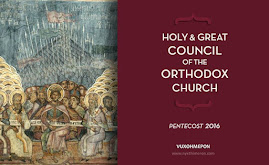
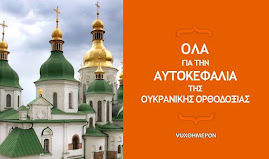
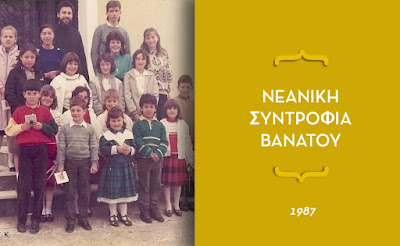
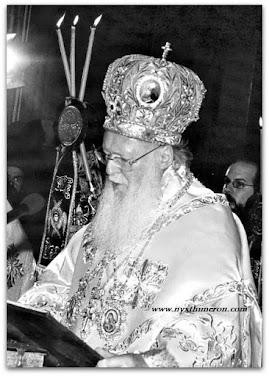





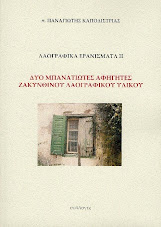
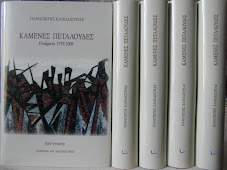

Δεν υπάρχουν σχόλια:
Δημοσίευση σχολίου